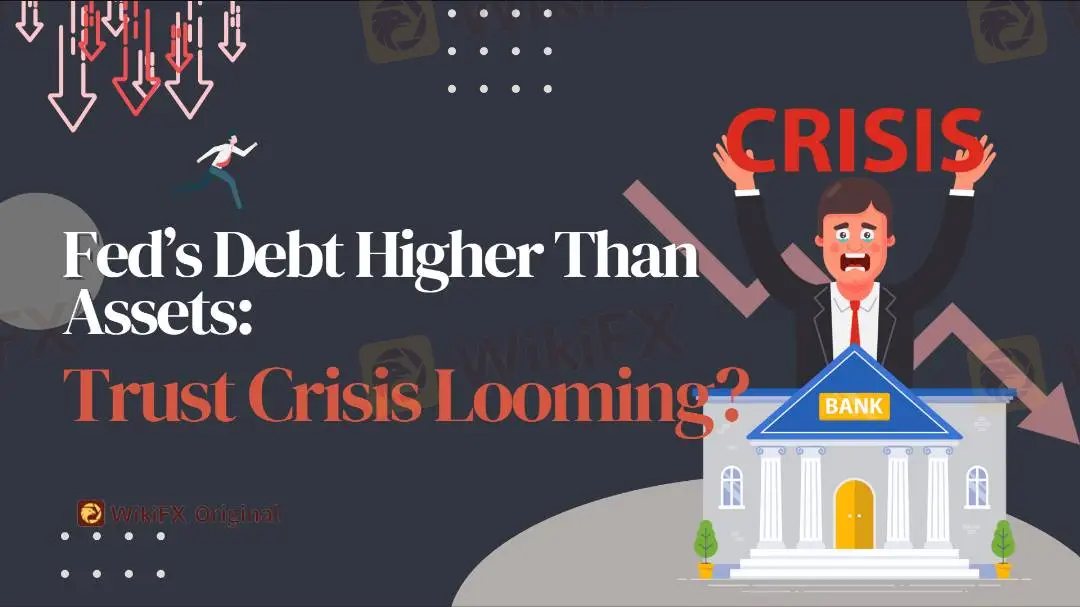简体中文
繁體中文
English
Pусский
日本語
ภาษาไทย
Tiếng Việt
Bahasa Indonesia
Español
हिन्दी
Filippiiniläinen
Français
Deutsch
Português
Türkçe
한국어
العربية
Fed’s Debt Higher Than Assets: Trust Crisis Looming?
Abstract:Since last year, the Federal Reserve (Fed) has implemented a series of interest rate hikes, resulting in increased interest costs for banks' reserve holdings. However, the returns on their assets have remained largely unchanged, leading to a situation where debt outweighs assets. This has raised concerns among market participants as any loss of confidence in the Fed could potentially cause significant disruptions.

According to a report from ChinesePress News, based on the H.4.1 balance sheet data as of the week ending April 27th, the indicator “Other Liabilities and Capital,” used to assess the net assets of the Federal Reserve, stood at negative $3.27 billion.

According to the accounting principles of the Federal Reserve, accumulated losses are recorded as “deferred assets” on the balance sheet under the asset column. Although this number is nominally an asset, it is essentially equivalent to accumulated losses, according to the Brookings Institution. As of the end of April, the Federal Reserve's deferred assets exceeded $52 billion, surpassing its paid-in capital and surplus, resulting in a negative net asset value.
The impact of the central bank's financial situation on the market remains to be seen. This appears to be the first time the Federal Reserve has encountered substantial negative assets, and the number of central banks in developed economies facing losses or negative net worth is unprecedented.
The report indicates that although this will not hinder the central bank's operations, there are two concerns in the market. One risk is the loss of confidence in the currency issued by the central bank. If panic intensifies, it may affect exchange rates.
The other risk is related to the central bank's independence, which could disrupt the market. When the Reserve Bank of Australia revealed a negative net worth in September last year, then-World Bank President Malpass stated that a central bank with negative book value would require even greater political support.

Disclaimer:
The views in this article only represent the author's personal views, and do not constitute investment advice on this platform. This platform does not guarantee the accuracy, completeness and timeliness of the information in the article, and will not be liable for any loss caused by the use of or reliance on the information in the article.
Read more

Dark Side of AETOS: They Don’t Want You to Know
AETOS is an Australia-based broker. All over the internet, you will find positive reviews about this broker, but no one is talking about the risks involved with AETOS. However, we have exposed the hidden risks associated with AETOS

Contemplating Investments in Quotex? Abandon Your Plan Before You Lose All Your Funds
Have you received calls from Quotex executives claiming to offer you returns of over 50% per month? Do you face both deposit and withdrawal issues at this company? Or have you faced a complete scam trading with this forex broker? You're not alone. Here is the exposure story.

15 Brokers FCA Says "Are Operating Illegally" Beware!
If a reputable regulator issues a warning about unlicensed brokers, it's important to take it seriously — whether you're a trader or an investor. Here is a list you can check out- be cautious and avoid getting involved with these scam brokers.

Scam Alert: Revealing Top Four Forex Scam Tactics Employed to Dupe Investors
Gaining and losing on forex trades is normal, but not scams that siphon out millions in no time! In this article, we will reveal forex scam tactics. Read on!
WikiFX Broker
Latest News
PrimeXBT Launches MT5 PRO Account for Active Traders
eToro Expands into Singapore with MAS CMS Licence
Renault shares plunge 16% after French carmaker lowers guidance, appoints new interim CEO
Darwinex Launches INDX: A Revolutionary Investment Strategy for Traders
Top Forex Trading Scams to Watch Out for in 2025
Real Risk Factors with Admiral Markets ! Explained
5 Reasons to Know Why INFINOX Is a Standout Broker?
5 things to know before the stock market opens Wednesday
Trump's big beautiful bill' caps student loans. Here's what it means for borrowers
Weekly mortgage demand plummets 10%, as rates and economic concerns rise
Currency Calculator


